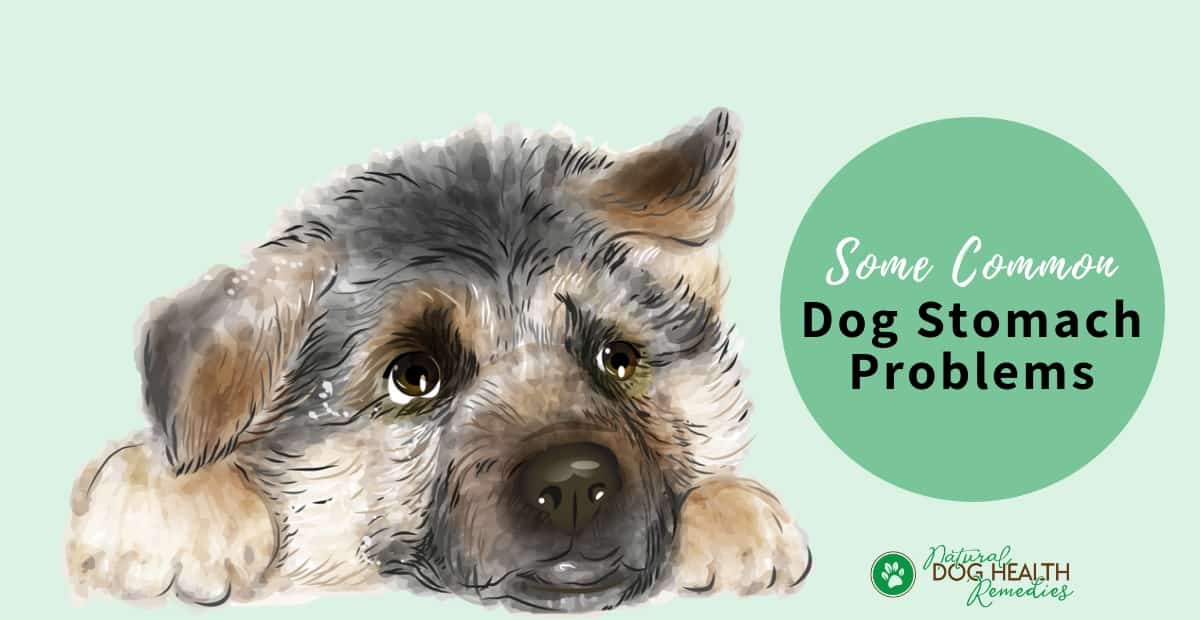Dog Stomach Problems

Overview
Like people, dogs can develop stomach problems quite easily. While some problems are not so serious and easy to treat, a few dog stomach problems (e.g. stomach ulcers, bloat) can wreak havoc to a dog's health and can even be life-threatening.
As dog parents, therefore, it is essential that we learn more about the different types of dog stomach problems and how to care for our dogs when they are having upset tummies.
How Do You Know if Your Dog has Stomach Problems?
It is not difficult to tell that a dog has a stomach problem, since there are various stomach- or digestion-related symptoms that we can look out for, including:
- diarrhea
- nausea and/or vomiting
- flatulence
- constipation
- appetite loss
- stomach bloat and/or pain
- blood in stool and/or vomitus
Some Common Dog Stomach Problems
Here are some rather common stomach issues in dogs:
Food Sensitivity or IntoleranceWhile real cases of canine food allergies are rather rare, quite a few dogs show intolerance to certain food items (similar to food intolerance in people).
Food intolerance usually causes diarrhea and vomiting in dogs (but not itchy skin and other skin problems as caused by real food allergies). The symptoms (diarrhea, vomiting) occur a few hours after the dog has eaten the offending food item(s).
Fortunately, this dog stomach problem can easily be treated by identifying and eliminating the offending food item(s) from the dog's diet.
Swallowed ObjectsSometimes a dog may have swallowed an inedible object (e.g. a tennis ball) which is too big, once swallowed, to be regurgitated back up or pass through the stomach to the intestine.
The object therefore just sits in the stomach causing chronic stomach irritation. The dog may vomit several times a week and may show signs of stomach pain.
An x-ray is necessary to diagnose this problem and surgery may be necessary to remove the object from the stomach.
Inflammatory Bowel Disease (IBD)IBD is one of the most common causes of gastrointestinal problems in dogs. It is characterized by chronic diarrhea and/or vomiting.
IBD is an autoimmune disease and, in order to get a definitive diagnosis, an endoscopic biopsy needs to be done.
Sometimes, if a dog is showing the classic IBD symptoms, IBD will be assumed and the dog will be treated accordingly to see if the symptoms go away.
GastritisGastritis (inflammation or infection of the stomach lining) can be either acute or chronic.
 Acute gastritis is usually caused by dietary indiscretion or poisoning (e.g. ingestion of antifreeze). Some conventional medications such as NSAIDs can also cause acute gastritis in dogs.
Acute gastritis is usually caused by dietary indiscretion or poisoning (e.g. ingestion of antifreeze). Some conventional medications such as NSAIDs can also cause acute gastritis in dogs.
Dogs suffering from food allergies or taking certain meds (e.g. NSAIDs) for an extended period of time often have chronic gastritis.
Dogs with gastritis suffer from vomiting on and off. Diagnosis is by doing several tests such as blood test, urinalysis, and fecal analysis. A definitive diagnosis of chronic gastritis can be made by an endoscopic biopsy.
ColitisColitis is another rather common stomach problem in dogs.
It is an inflammation of the colon, characterized by diarrhea, which may be bloody, and the dog may strain to poop. Sometimes, the dog may also have gas and stomach cramps.
An acute episode of colitis could be caused by stress or ingestion of something inappropriate. Chronic colitis may be caused by parasites, IBD, or food allergy.
For more information, please read this article on colitis in dogs.
BloatingBloating (gastric dilatation) can be accompanied by stomach twisting (volvulus) and is a very serious acute problem which, if left untreated, can be fatal.
Be sure to visit this page to learn more about the symptoms and how to deal with the problem.
Stomach UlcersMost cases of stomach ulcers in dogs are caused by the use of anti-inflammatory medications such as NSAIDs. Typical symptoms include vomiting, sometimes with blood, and black, tar-like stool.
Dog Care for Upset Stomach
As you can see, there are quite a few possible reasons for dogs to have an upset stomach.
The most important thing to do is to monitor your dog's symptoms closely and try to get a definitive diagnosis if the symptoms (e.g. diarrhea, vomiting) do not go away in a day or two.
In the meantime, there are quite a few things that you can do to alleviate the symptoms and make your dog feel a bit more comfortable.
Please visit our pages on how to use remedies to control and manage diarrhea and vomiting in dogs.
In addition, dogs with upset stomach can be fed some special natural foods to help them feel better. Click here for more information.
ReferencesEldredge, et al. Dog Owner's Home Veterinary Handbook 4th edition (Wiley Publishing, 2007).
Merck Publishing and Merial. The Merck/Merial Manual for Pet Health (Merck, 2007).
R.H. Pitcairn, The Complete Guide to Natural Health for Dogs and Cats (Rodale, 2005).





